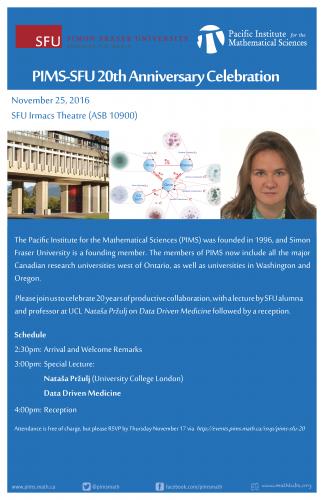PIMS 20th Anniversary Celebration at SFU
Speakers
Details
The Pacific Institute for the Mathematical Sciences (PIMS) was founded in 1996, and Simon Fraser University is a founding member. The members of PIMS now include all the major Canadian research universities west of Ontario, as well as universities in Washington and Oregon. Please join us to celebrate 20 years of productive collaboration, with a lecture by SFU alumna and professor at UCL Nataša Pržulj on Data Driven Medicine followed by a reception.
Attendance is free of charge, but please RSVP by Thursday November 17 to allow us to plan for catering, via
Program:
2:30pm Welcome and opening remarks
3:00pm Lecture: Nataša Pržulj (University College London) Data Driven Medicine
We are faced with a flood of molecular and clinical data. Various biomolecules interact in a cell to perform biological function, forming large, complex systems. Large amounts of patient-specific datasets are available, providing complementary information on the same disease type. The challenge is how to model and mine these complex data systems to answer fundamental questions, gain new insight into diseases and improve therapeutics. Just as computational approaches for analyzing genetic sequence data have revolutionized biological and medical understanding, the expectation is that analyses of networked “omics” and clinical data will have similar ground-breaking impacts. However, dealing with these data is nontrivial, since many questions we ask about them fall into the category of computationally intractable problems, necessitating the development of heuristic methods for finding approximate solutions.
We develop methods for extracting new biomedical knowledge from the wiring patterns of large networked biomedical data, linking network wiring patterns with function and translating the information hidden in the wiring patterns into everyday language. We introduce a versatile data fusion (integration) framework that can effectively integrate somatic mutation data, molecular interactions and drug chemical data to address three key challenges in cancer research: stratification of patients into groups having different clinical outcomes, prediction of driver genes whose mutations trigger the onset and development of cancers, and re-purposing of drugs for treating particular cancer patient groups. Our new methods stem from network science approaches coupled with graph-regularised non-negative matrix tri-factorization, a machine learning technique for co-clustering heterogeneous datasets.
Biography: Nataša Pržulj is Professor of Biomedical Data Science at University College London (UCL). She is a Simon Fraser University alumna who graduated with a dual B.Sc. First Class Honors in Mathematics and Computer Science. She obtained her M.Sc. and Ph.D. in Computer Science at the University of Toronto and also held positions at UC Irvine and Imperial College London. Dr. Pržulj is a Fellow of the British Computer Society (BCS) and was elected into the Young Academy of Europe. She has received various awards, among which the 2014 BCS Roger Needham Award for her research contributions. Dr. Przulj is renowned for initiating extraction of biological knowledge purely from wiring patterns (topology) of "Big Data" real-world networks. That is, she views the wiring patterns of large and complex molecular networks, disease ontologies, clinical patient data, drug-drug and drug-target interaction networks etc., as a new source of information that complements the genetic sequence data and needs to be mined to gain deeper biomedical understanding. Her recent work includes designing machine learning methods for integration of heterogeneous biomedical and molecular data, applied to advancing biological and medical knowledge. She also applies her methods to economics.
4:00pm Reception

